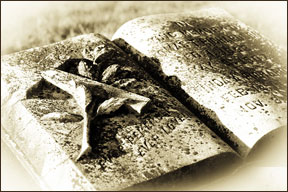 I’m not religious. I’m not one of the “faithful”. I’m not even a little bit traditional. Yet at this time of year, I find myself looking for deeper meaning in life largely because the religion I was born into commands it.
I’m not religious. I’m not one of the “faithful”. I’m not even a little bit traditional. Yet at this time of year, I find myself looking for deeper meaning in life largely because the religion I was born into commands it.
I can’t tell you how much this sort of Pavlovian spirituality pisses me off.
As a Jew, my job during these “days of awe” between Rosh Hashanah and Yom Kippur is to make amends for transgressions during the past year and swear promises for “being better” in the next. The book of life is open & we must ask forgiveness of those we have wronged before God will write us in it for the upcoming year. For those of us with short attention spans, it’s actually a relief to know God metes out our fate a year at a time. Makes shit easier.
So it’s not unexpected that in the 2+ years since my MS diagnosis, the yearly musing over my own mortality has taken on very different feel. Something more… personal. While I used to go to synagogue and drone though my “al Chet” from memory along with the rest of my parent’s congregation, I now have a new Yom Kippur tradition. And it’s all the Bible’s fault. Let me ‘splain. No, there’s too much. Let me sum up.
During this time of year, the story of “The binding of Issac” is read in Temple. Cliff notes version: God tells Abraham to take his beloved son Issac to Mount Moriah and sacrifice him to prove his unquestioning faith. At the last minute, God calls out for Abraham to stop who then responds with the phrase “Hinneni” or “I am here”.
Rabbis, of course, debate what Abraham meant in his response, down to the language itself. Is there a difference in intent between “I am here” and “Here I am”? Was Abraham simply acknowledging God’s call like the hebrew equivalent of a foursquare check in, or can this phrase hold a much deeper meaning?
That physically being someplace is not at all the same as being present.
If you had to ask yourself which was true for you right now, how would you answer? Yeah. Me too. Thusly, my new tradition: make an effort to be present if I have forgotten how.
Today, as we mourn the heartbreaking loss of Steve Jobs, I am reminded that he always knew the difference. His 2005 commencement speech at Stanford, “How to live before you die”, which followed recovery from his first Pancreatic Cancer surgery, proves that “Hinneni” is a concept he embraced to the very end:
“My third story is about death. When I was 17 I read a quote that went something like “If you live each day as if it was your last, someday you’ll most certainly be right.” It made an impression on me, and since then, for the past 33 years, I have looked in the mirror every morning and asked myself, “If today were the last day of my life, would I want to do what I am about to do today?” And whenever the answer has been “no” for too many days in a row, I know I need to change something. Remembering that I’ll be dead soon is the most important thing I’ve ever encountered to help me make the big choices in life, because almost everything–all external expectations, all pride, all fear of embarrassment or failure–these things just fall away in the face of death, leaving only what is truly important. Remembering that you are going to die is the best way I know to avoid the trap of thinking you have something to lose. You are already naked. There is no reason not to follow your heart.”
So as Yom Kippur approaches this week, I will ask myself if I am really truly present in my life every single day, or just … here. And if the answer isn’t one I am proud of, I will now ask myself one other question:
“What would Steve do?”

Posted by ms catminder on October 6, 2011 at 2:07 am
I loved this. Thank you.